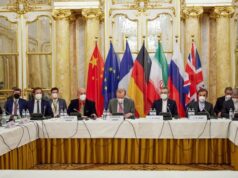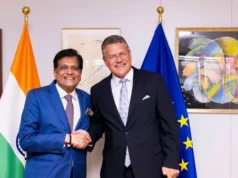Few things come out clearly
• Treachery of the British…..this is how we lost GILGIT BALTISTAN also
• Not Court-Marshalling General Roy Butcher
• Not appointing an Indian as C-In-C on 15 Aug1947. With no experience of Administration Nehru himself became PM but denied the opportunity to Army
• Imagine if Hyderabad case too had gone to UN
• Nehru was not moved by daily rapes and butchering of Indians by Nizam’s Razakars, even fought with Patel
• Nehru was galvanised into Action. With anger on reading the British High Commissioner’s report on raping of the British Nuns
(LK Advani in LK Advani’s Blog )
Last month, I wrote a blog titled: Dr. Munshi’s Historic Letter to Pandit Nehru.
In the Tailpiece to this blog I had recalled what I had read in a recent Pioneer report that Panditji wanted to refer the Hyderabad issue also to the U.N. Security Council and he had strongly disapproved of Sardar Patel’s decision to send the army into Hyderabad.
The Pioneer report was based on a book written by an IAS officer, one MKK Nair. In my blog relating to Dr. Munshi’s letter, I had said that I have been desperately searching for the book on which the news report was based, but I have not been able to locate it at any bookstore or even in any library. Shri Chandan Mitra, Pioneer Editor also had been unable to get it for me. Through this blog, I appealed to all my readers that I would feel “greatly indebted” to whosoever can procure the book for me. I also asked a senior leader of the Kerala BJP, and a former Parliamentary colleague of mine, Shri O. Rajagopal, to try to locate the book.
I am very happy that these efforts have borne fruit, thanks particularly to Rajagopalji. It appears that the book had been written in Malayalam. The news item in the Pioneer was based on that. The book was in the process of being translated into English. The translator, Shri Gopakumar, has now addressed a letter to me, and along with the letter sent me a copy of the translated manuscript which he writes would be published by the publishers soon after appropriate editing.
Going through the relevant portions of the book, I find that the cabinet meeting which occasioned a sharp exchange between Nehru and Patel on the Hyderabad issue took place shortly before the so called ‘police action’ actually took place in 1948. This was also a phase when Lord Mountbatten had left for London, and Rajaji had become Governor General.
What follows in MKK Nair’s book is an episode which casts a serious reflection on some British army officials hostile to India. Instead of paraphrasing this episode, or giving just its summary, let me put on record what Nair has exactly said in his book titled “The Story of an Era Told without Ill Will”.
Nair writes:
“On April 30, 1948, Indian Army withdrew fully from Hyderabad. After that, Rizvi and the Razakars began to behave licentiously all over the state. Mountbatten had left and Rajaji was the Governor General. Nehru, Rajaji and Patel were all aware of the dangerous situation prevailing in Hyderabad. Patel believed that the army should be sent to put an end to the Nizam’s wantonness. At about that time, the Nizam had sent an emissary to Pakistan and transferred a large sum of money from his Government account in London to Pakistan. At a cabinet meeting, Patel had described these things and demanded that army be sent to end the terror-regime in Hyderabad. Nehru who usually spoke calmly, peacefully and with international etiquette, spoke losing his composure, ‘You are a total communalist. I will never accept your recommendation.”
Patel remained unperturbed but left the room with his papers.
The situation in Hyderabad worsened day by day. Rajaji wanted to find a solution to the basic issue and also conciliate between Nehru and Patel. He called V P Menon and talked to him. VP let Rajaji know that the army was being kept battle-ready and could be asked to attack at any time. Rajaji invited Nehru and Patel to come to Rashtrapati Bhavan (then the Governor General’s house) next day. V P Menon was also asked to be present. As V P Menon was on his way to Rashtrapati Bhavan for the meeting, an ICS officer named Butch (from the State Home Ministry who had conducted discussions for integration of Travancore and Kochi) stopped him and handed over a letter. It was from the British High Commissioner and protested the rape of seventy year old nuns of a convent two days earlier by Razakars. V P Menon handed over the letter to Rajaji when he reached for the meeting.
The meeting at Rashtrapati Bhavan began after Nehru and Patel arrived. Rajaji in his typical style described the situation in Hyderabad. He felt that, to safeguard India’s reputation, a decision should not be delayed any longer. Nehru was concerned about international repercussions. Rajaji then played his trump card – the letter from the British High Commissioner. Nehru read it. His face turned red and veins bulged on his bald head. Anger choked his words. He shot out of his chair, slammed his fist on the table and cried out, ‘Let’s not waste a moment. We’ll teach them a lesson.’
Rajaji immediately told V P Menon, ‘VP, inform the Commander in-Chief to proceed according to the plan’
VP conveyed the order to General Roy Butcher. Nehru sat with his head in his hands. He drank tea and remained silent. Rajaji smiled and said: ‘If it is cancer, it has to be removed, even if it is painful.’
VP Menon returned to his office after the meeting and quickly planned the things to be done. The Commander-in-Chief of Pakistan was also an Englishman who nursed feelings of enmity with Indian leaders. When Butcher took over from General Lockhart as Commander in-Chief, he had sworn allegiance to India in God’s name. Soon after Butcher heard from V P Menon, he instructed Rajendra Singh who asked General Choudhary to begin military action at three next morning. At seven that evening, Butcher contacted Karachi and spoke with his counterpart there. The conversation was in French.
Next morning at ten, V P Menon walked into Butcher’s room. Assuming that he had come for details of the Hyderabad action, Butcher brought him up to date with its progress. VP then said, ‘I know all that. I have come for something else. Did you speak with Pakistan’s Commander in-Chief yesterday evening.’ Hearing this, Boucher’s face went pale.
“VP, are you saying that we friends cannot speak with each other?”
“Was that a friendly conversation?”
“Do you doubt it?”
“Why did you speak in French?”
“Have you started tapping telephones?”
“Shouldn’t we if circumstances warrant? Was it really a friendly chat?’
“Of course!”
VP Menon took out a document and gave it to Butcher. It was the transcript of the previous evening’s conversation and an English translation which read:
Butcher: Attack on Hyderabad begins tonight. Will not last many days. If you must do anything, do so right away.
Pakistan C-in-C: Thanks. Shall inform Liaquat Ali. Jinnah is on his deathbed.
Butcher: After I do my duty, I shall be in your hands.’
Butcher who had pretended to be offended by telephone-tapping was sweating now. He looked sorrowfully at V P Menon and said, ‘What should I do, VP? I have made a mistake. I am sorry.’
V P Menon asked him, ‘Did you not swear allegiance to India in the name of God, with your hand on the Bible?’
Butcher: ‘VP, please save me. I am willing to atone for what I have done. Don’t humiliate me. Help me for our old friendship.’
V P Menon obtained a letter from Butcher that read, ‘I resign on personal and health grounds. Please accept it immediately’ and left. General Cariappa was then given charge of the Indian Army




